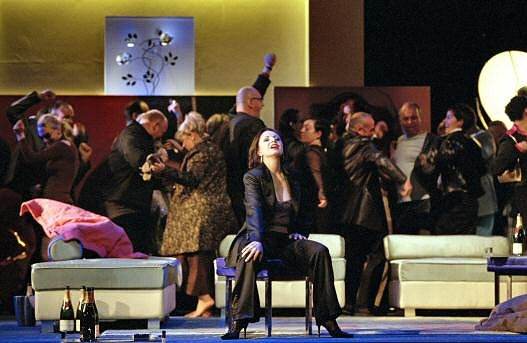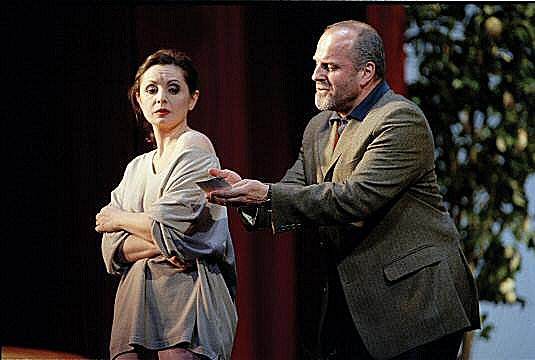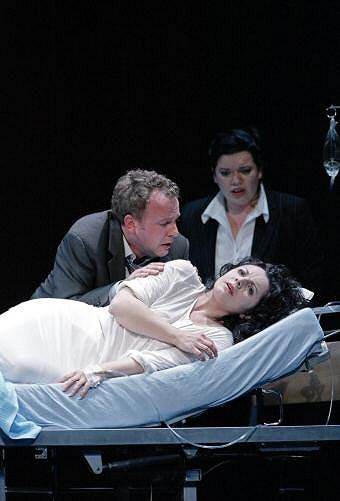S & H Opera Review
G. Verdi ‘La Traviata’ Welsh National Opera, Cardiff 15th May 2004 (new production première) (BK)
Conductor: Tugan Sokhiev
Directors: Patrice Caurier and Moshe Leiser
Designer: Christian FenouillatCostume Designer: Agostino Cavalca
Lighting: Christophe ForeyCast
Violetta Valéry: Nuccia Focile
Flora: Amanda Baldwin
Marquis of Obigny: Gareth Rhys-Davies
Baron Douphol: Eddie Wade
Doctor Grenvil: David Soar
Gaston: Philip Lloyd HolthamAlfredo Germont: Peter Wedd
Annina: Sian Meinir
Giuseppe: Michael Clifton-Thompson
Giorgio Germont: Christopher Purves
Postman: Bill King
Flora’s Servant: George Newton-FitzgeraldWNO Orchestra, Leader John Stein
WNO Chorus, Chorus Master Donald Nally
Photographs by Bill Cooper
Nuccia Focile as Violetta
Now here’s a remarkable thing: you leave this Traviata caring about its characters. They might be in an opera but they’re people first and foremost. They’re not exactly like you of course, but you can see that they could be; if you were in their shoes or they were in yours.
To bring opera to life like this requires a rare intelligence distributed evenly between directors and performers. This what happens here and it makes for one of the best Traviatas seen in the UK in a long while. The contemporary setting works well because it is self-evidently thoughtful.
Directors Patrice Caurier and Moshe Leiser, take the view that Traviata is a tragedy rather than melodrama. They believe that tragedy occurs only when everyone involved in a situation acts ethically according to particular but conflicting lights and as a consequence, glib judgments cannot be made about rights and wrongs or good or bad behaviours. All that can be said is that everyone involved is human, making sense of their lives in the best way they can. This was the case when Dumas wrote La dame aux camélias and it is equally true today.
Modern settings need modern behaviours from the singer/actors to be consistent. The ageing party goers in Act 1 dance the Twist to the opera’s music (some of them rather badly), Violetta drinks too much after brooding on her illness and knocks over an occasional-table, Alfredo is tongue-tied and awkward on meeting his ‘celebrity’ face to face and he sings the Brindisi nervously. His chance of success with Violetta might be slight, but he is determined to give it his best shot. It is all persuasive; you end up thinking that this is how things would be.
Violetta (Nuccia Focile) and Germont Père (Christopher Purves)
There are some equally deft touches in Act 2. In Scene 1, a breakfast table complete with corn flakes packet is laid out at the back of the stage. In the foreground a baby grand piano and a cello stand side by side. It's Truly, Madly, Deeply all over again but this time the piano is Alfredo's. When Germont père arrives, Violetta indicates that she agrees to his request to leave Alfredo only because she is dying. Germont, on the other hand, begins to realise immediately though how great her sacrifice really is. The human dilemmas are balanced here: there's no point in taking sides.
Violetta, Alfredo (Peter Wedd) and Annina (Sian Meinir)
Act 3 finds Violetta lying in a hospital bed attached to a drip-line. A television set is mounted on the wall opposite and after re-reading the conciliatory letter from Germont, she switches the set on to watch the carnival in the streets. Impatiently, she switches it off again and as Alfredo returns, she makes one final effort to get up from her bed supported by the drip-stand. She collapses of course but gives Alfredo a photograph of herself from a glossy magazine. He must remember her as the famous woman he fell in love with and not as she is now.The intelligence of the production is matched by equally intelligent musicianship. Tugan Sokhiev has a way with phrasing that combines rhythmic precision and impulse with a relaxed spaciousness that allows the music (and his singers) to ‘breathe.’ There is no loss of drama or lyricism in his approach either. Certainly on Saturday he brought an unexpected freshness to this familiar music which encouraged his singers to give of their best.
Nuccia Focile made an appealing Violetta with both with her singing and acting, even though she had deputised at the last minute for Alexia Cousin who was indisposed. She shares the role with Alexia Cousin throughout the rest of the run. Focile’s Sempre libera was gloriously uninhibited and Ah, fors’ è lui was touching and passionate. Her scene with Germont père (Christopher Purves) was also particularly moving and here Purves himself produced expressive and beautiful lyric baritone singing. His Di Provenza, il mar was frankly memorable.
Peter Wedd as Alfredo showed great promise in Act 1, acting and singing the overawed suitor with considerable flair. If there was a problem with his singing in the rest of the performance, it was that by contrast with the other principals, he seemed physically tense a good deal of the time. His tenor obviously has great potential but whereas Nuccia Focile and Christopher Purves sang with a relaxed ease that matched Tugan Sokhiev’s direction perfectly, Peter Wedd seemed not to have quite the same degree of confidence in this first night performance.
WNO’s Chorus and Orchestra were all on good form as were the other principals and the attractive set, costume designs and lighting plot completed the audience’s obvious enjoyment of this excellent new production.
Bill Kenny



 Return to:
Return to: